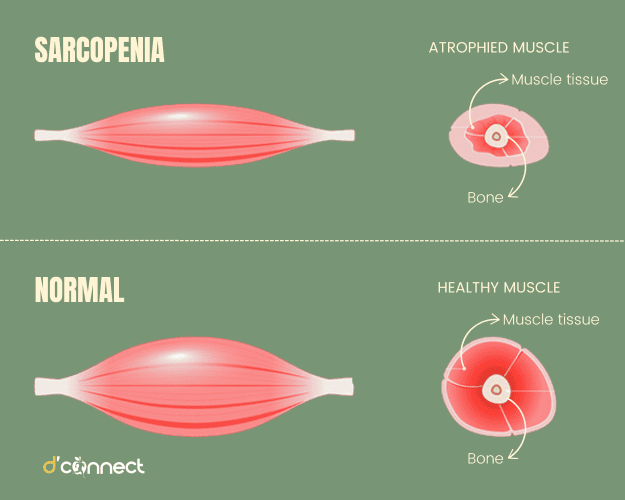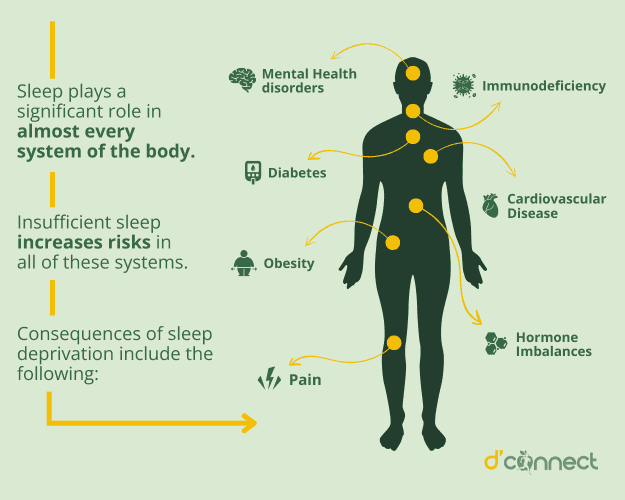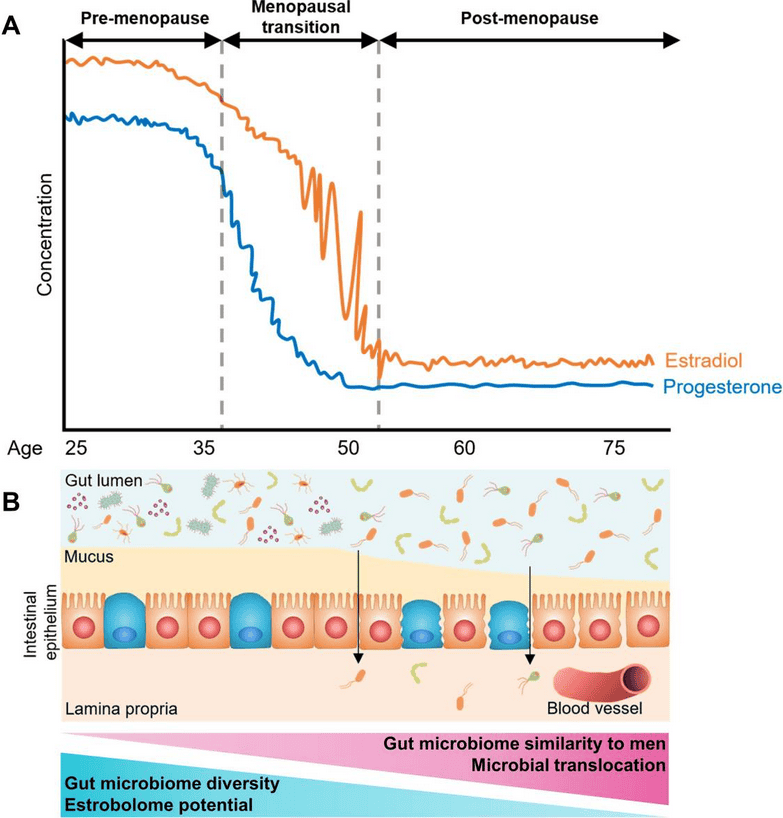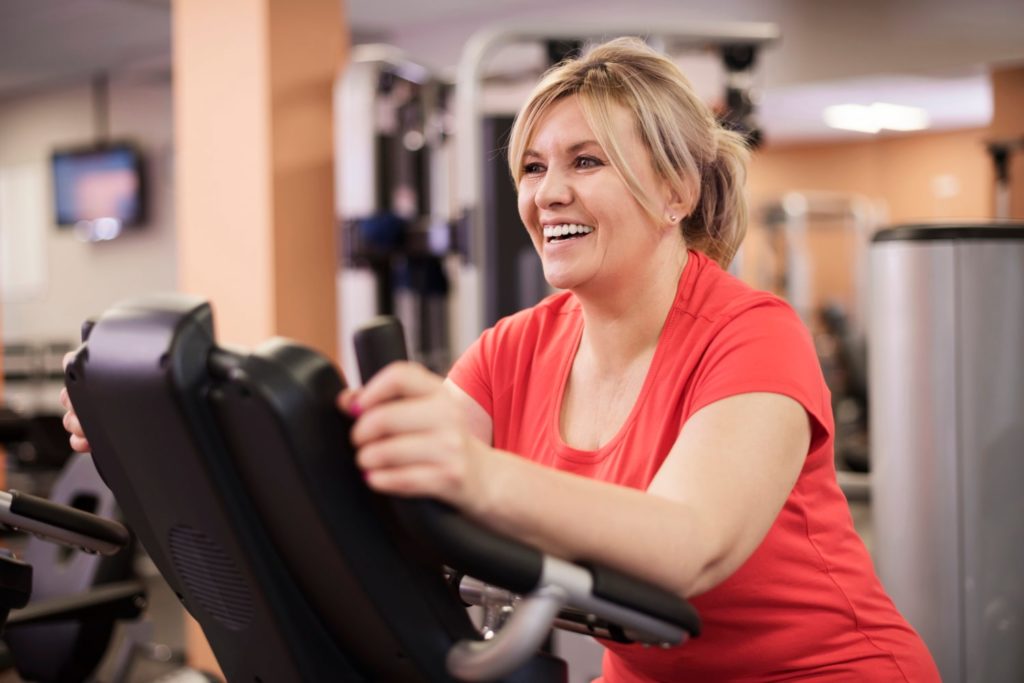
Kàren Maggs
(Midlife and Menopause Coach, Menopause Doula and Certified practitioner My Menopause Transformation)
As we navigate midlife and menopause, one of the most common questions I get asked is “how can I lose this extra weight?”
Weight gain at this time is caused by a combination of things, not just menopause. It includes
- Hormones
- Genetics
- Physiology
- Culture
and your life to date.
Your body is not failing you, but is actually working hard to adjust to the loss of oestrogen and to bring itself back into balance.
The effect of hormones on our muscles
What many people don’t realise is that muscle mass in women begins to decline starting in their 30s. It then declines even faster when we reach our 50s.
When women begin perimenopause and oestrogen begins to decline, it affects muscle fibres, particularly those controlling power and strength. In fact, women can lose anywhere between 10-40% of the fibres that create power and strength in muscles.[1] Muscle loss is called sarcopenia.

Exercise helps to get energy back and build those power and strength muscle fibres. According to Dr Wendy Sweet, PhD and founder of My Menopause Transformation, exercising in a way that provides steady aerobic action for 30-60 minutes is key.
Walking is very popular for midlife women, as is swimming which has the added advantage of being gentle on joints.
Strength training is crucial in avoiding muscle loss
It’s interesting to note that there is a growing body of evidence that indicates hormone therapy has beneficial effects on muscle mass, strength, and related muscle connective tissue.[1]
Sleep and our body’s resilience
Although it sounds strange, sleep is an important factor in weight gain in peri/menopause. The reduced sleep that often results from menopausal symptoms may play a role in the weight gain commonly associated with menopause.
RELATED — Why we sleep: The role of sleep in our healthy life
Women sleeping 7-8 hours a night have the lowest risk of weight gain, with women sleeping 6 hours a night 12% more likely to gain weight and those sleeping 5 hours or less were 32% more likely.[3]
Sleeping 5 hours or less per night increases the risk of weight gain by 32%
If you are feeling like your sleep is terrible, you are not alone. According to the US Centres for Disease Control and Prevention more than half of all perimenopausal women sleep less than 7 hours a night.[4]
When we are sleep deprived our body can struggle. Sleep is essential for many vital functions including
- Development
- Energy conservation
- Brain waste clearance
- Modulation of immune responses
- Cognition
- Performance
- Vigilance
- Disease
- Psychological state[5]

It’s therefore important to maximise our sleep as we go through perimenopause in order for our body to reduce the possibility of weight gain, as well as allowing it time for detoxification and healing.
Why most exercise programmes don't work for midlife women
As your body and brain changes through midlife you may find that the exercise you used to do that kept you feeling fit, healthy and strong no longer seems to work.
There can be a combination of things going on here. One is that there simply isn’t the energy for exercise, particularly if you are sleep deprived.
RELATED — Training and menopause: How can exercise positively affect your transition?
Another factor can be sore joints, meaning exercising how you used to actually hurts and creates more pain. Then, there can be increased fatigue after exercise, rather than increased energy.
In addition to this, our bodies are reacting to and susceptible to stress that has quite often been going on for decades. Intense exercise, although extremely beneficial for some menopausal women, can sometimes put more stress on a women’s menopausal body. This increases cortisol levels and reduces the body’s ability to lose weight.[6]
The Integrative Women’s Health Institute suggests that if cortisol levels are low, high, or out of balance, it’s important to start with spending more time each day with the nervous system in a calm, relaxed state in order to build stress resilience before adding the additional stress of intense exercise.
This is also key if progesterone is low, or sleep is poor. Start with consistent nature walks, swimming at a moderate pace, yoga (low to moderate exertion, not hot power yoga!), mind-body exercise, or meditation.
Do this kind of exercise at least 3-4 times per week consistently for a month, then begin to explore adding intensity.
The Australian Longitudinal Women’s Health research reports that women in their 50’s are one of the highest population groups to stop being active. Women around menopause age have been reported to have more perceived barriers to exercise than younger and older women.[7]
Exercise is extremely important for long term health and wellbeing, according to a study completed in Australia.[8]
In this study they found that if women met the physical activity guidelines in earlier midlife and especially by age 55, then this resulted in better physical health-related quality of life outcomes in later life.
Finding exercise that works for you
Did you know that most exercise programmes have been developed by men for men and do not take into consideration a woman’s cyclical nature?
Females are significantly under represented in sport and exercise studies, and nearly one in five studies on sport psychology include exclusively male participants.[9]
Our hormones have a role to play in what exercise works for us. According to Dr Emma Ross, who holds a PhD in Exercise Neurophysiology, only 4% of sport and exercise science studies are exclusively done on women, which means our hormones aren’t taken into consideration in the development of mainstream fitness programmes.[10]
Only 4% of sport and exercise science studies are exclusively done on women
Current thinking is that before peri/menopause 4-5 x 45-60 minutes of exercises every week is the optimum but when moving through peri/menopause change this to 3-5 days per week with a duration of 30-60 minutes. This can be adjusted to suit your needs and abilities.[11]
Another interesting thing to note is that it’s now been shown that cardio and resistance training at a moderate rate works better for women, while high intensity training works better for men.[12]
Mixing it up with different types of exercise each week is also beneficial. The three key areas to include are:
- aerobic
- strengthening
- flexibility and balance[13]
Included in aerobic exercise are brisk walking, hiking, working out on a rowing machine or elliptical trainer.[14]
Strengthening exercise can include any weight bearing exercise which includes body weight, free weights or weight machines.
Flexibility and balance exercises include yoga, mat pilates, Tai Chi and stretching.[15]
Gut health
A healthy gut lowers the risk of heart disease, dementia, obesity, depression and cancer. It also helps to reduce your experience of menopause symptoms.[16]
Oestrogen and progesterone are known to be important regulators in the immune system, and are also thought to be similarly important in the gastrointestinal tract. Menopause reduces gut barrier integrity although few studies have examined this aspect to date.[17]

(A) Trajectory of estradiol and progesterone concentration during a woman’s adulthood, showing declines during the menopausal transition and low levels post-menopause.
(B) Diagram of putative gut microbiome and gut epithelium changes during menopause. With declining estradiol and progesterone, diversity of the gut microbiome and estrobolome potential is reduced, and microbiome composition becomes more similar to men.
As well as digestion and absorption of key nutrients, the gut also processes and excretes your hormones. Although research is relatively new in this area, it appears that our gut microbiome gets disrupted by fluctuating oestrogen levels, causing many symptoms such as
- Weight gain
- Hot flushes
- Anxiety
- Brain fog
- Low energy
Improving our gut health and supporting a diverse range of microbiome can help to alleviate these symptoms.[18]
A study in 2019 showed that eating processed foods for as little as two weeks can reduce the diversity of your gut microbiome by 40%.[19]
Eating processed foods can reduce gut microbiome by 40% within two weeks
RELATED — Food additives: Banned worldwide, but permitted in New Zealand
Estrobolome is a gut bacteria which metabolises oestrogen and its job is to ensure the level of oestrogen in our body is just right.[20] Things get out of balance with a poor diet, chronic stress and overuse of antibiotics.
A plant based diet helps ensure the microbiome, including estrobolome, is at its healthiest.[21]
Including prebiotics, probiotics and bitters in your diet will help to keep your gut microbiome healthy. Bitters include things like dandelion greens, endive, radicchio and arugula which are all digestive stimulants that will support your microbiome.[22]
Menopause can also exacerbate Irritable Bowel Syndrome, due to the decreases in oestrogen and progesterone which reduces stomach acid.[23]
A healthy diet can also help reduce IBS symptoms.
The importance of nutrition
Nutrition is vitally important as we go through menopause. Where we could get away with eating unhealthy foods in the past, our body is no longer able to support that. It’s time to up our game to ensure a long and healthy second half to our life.
RELATED — The Healthy Plate Model: Essentials of Healthy Eating
A diet that is mostly plants, wholegrains, legumes, nuts and seeds is key, which puts the Mediterranean diet at the top of the list. It has also been shown that the Mediterranean diet has beneficial effects in menopause related obesity because of its palatability and long-term sustainability.[24]
As well as being high in plants and fruits, the Mediterranean diet includes small amounts of seafood, eggs and poultry, with dairy and meat consumed sparingly. Adding in soybeans and green tea can also add to the benefits of the Mediterranean diet and helps with fat loss around the midsection.[25]
One of the issues causing weight gain in peri/menopause relates to glycemic stress. We tend to eat a lot of foods that have a high glycemic index (e.g. white bread, white potatoes, white rice).
The glycemic index measures how much the blood sugar rises after you eat a carbohydrate meal. White bread was used as the benchmark and has a glycemic index (GI) of 100. An apple has a GI of 38 and an avocado has a GI of 0.[26]
Processed foods have a very high GI, whereas whole foods and those high in protein have a low GI, meaning GI of 55 or less.
Items in the medium category have a GI of 56-69 and items that fall in the high category have a GI of 70 or over.
The focus should be on eating whole foods, mostly plant based and organic where possible. For instance,
- Asparagus
- Broccoli
- Spinach
- Cucumber
- Peppers
- Cooked carrots
are all low GI.
RELATED — Anti-cancer foods: The Healthiest Vegetables (Part 1)
Plain yoghurt, whole milk, peanuts, kidney beans, grapefruit and oranges are also low GI.
Whole foods and foods high in protein have a low GI
Variety is also key to a healthy body and weight, and this includes variety in your meals (i.e. not eating the same breakfast cereal every day or the same lunch every day).
In one study they compared two groups of men and women between 40-69 years. The first group had a wide variety of foods in their diet (grains and starches, vegetables and fruits, and protein foods, including fish and seafood, meat, poultry, eggs, legumes, and dairy products), and the second ate a limited diet with very little variety (refined rice, meat, sweetened drinks, and noodles).
The study found that those with more variety in their diet were at lower risk of metabolic syndrome.[27]
Metabolic syndrome is associated with insulin resistance and includes a number of medical conditions including obesity, particularly around the midsection.
Eating the same foods over and over again, means that your gut microbiome does not develop the diversity it requires for optimal health so it is therefore essential to eat a variety of foods on a daily basis to ensure nutrition levels and gut health remain optimal.
Conclusion
Weight gain in peri/menopause is affected by a number of factors and therefore requires a multi-faceted approach to ensure we remain at our healthiest.
Focusing on sleep, exercise, gut health and nutrition will all support your bid to remain at an optimal weight for your body’s wellbeing.
Kàren supports women who are juggling the multiple challenges of midlife, managing their perimenopause and menopause symptoms, rediscovering themselves, as well as stepping into their Second Spring (their post menopause years), which is full of excitement, passion and purpose…
If you would like to learn more about Kàren, see Expert: Kàren Maggs.
References
(1) Michael Tieland, Inez Trouwborst, Brian C Clark (2017). Skeletal muscle performance and ageing. https://pmc.ncbi.nlm.nih.gov/articles/PMC5803609/
(2) Peter M Tiidus, Dawn A Lowe, Marybeth Brown (2013). Estrogen replacement and skeletal muscle: mechanisms and population health. https://pmc.ncbi.nlm.nih.gov/articles/PMC5504400/
(3) Patel SR, Malhotra A, White DP, Gottlieb DJ, Hu FB. Association between reduced sleep and weight gain in women. Am J Epidemiol. 2006 Nov 15;164(10):947-54. doi: 10.1093/aje/kwj280. Epub 2006 Aug 16. PMID: 16914506; PMCID: PMC3496783.
(4) Mosconi L., (2024), p48. The Menopause Brain.
(5) Zielinski, M. R., McKenna, J. T., & McCarley, R. W., (2017). Functions and Mechanisms of Sleep. AIMS Neuroscience, 3(1), 67–104). https://pmc.ncbi.nlm.nih.gov/articles/PMC5390528/
(6) NZ Doctor Rata Aotearoa (2018). Exercise and Menopause: what you need to know. https://www.nzdoctor.co.nz/article/undoctored/exercise-and-menopause-what-you-need-know
(7) Débora Godoy-Izquierdo, Carlos de Teresa, Nicolás Mendoza, (2024); Exercise for peri- and postmenopausal women: Recommendations from synergistic alliances of women’s medicine and health psychology for the promotion of an active lifestyle. https://www.sciencedirect.com/science/article/pii/S0378512224000197#
(8) Binh Nguyen, Philip Clare,Gregore I. Mielke, Wendy J. Brown, Ding Ding, (2024). Physical activity across midlife and health-related quality of life in Australian women: A target trial emulation using a longitudinal cohort. https://journals.plos.org/plosmedicine/article?id=10.1371/journal.pmed.1004384
(9) Courtney C. Walton, Kate Gwyther, Caroline X Gao, Rosemary Purcell, Simon M Rice, (2022). Evidence of gender imbalance across samples in sport and exercise psychology. https://www.tandfonline.com/doi/full/10.1080/1750984X.2022.2150981
(10) Jeanette Kwakye (2022). Jennis Blog: What is the gender data gap and what can we do about it? https://www.jennis.com/blog/cyclemapping/theres-a-gender-data-gap-in-womens-health-and-we-need-to-fix-it/
(11) Kyu HH, Bachman VF, Alexander LT, Mumford JE, Afshin A, Estep K, Veerman JL, Delwiche K, Iannarone ML, Moyer ML, Cercy K, Vos T, Murray CJ, Forouzanfar MH. Physical activity and risk of breast cancer, colon cancer, diabetes, ischemic heart disease, and ischemic stroke events: systematic review and dose-response meta-analysis for the Global Burden of Disease Study 2013. BMJ. 2016 Aug 9;354:i3857. doi: 10.1136/bmj.i3857. PMID: 27510511; PMCID: PMC4979358.
(12) Copeland JL, Consitt LA, Tremblay MS. Hormonal responses to endurance and resistance exercise in females aged 19-69 years. J Gerontol A Biol Sci Med Sci. 2002 Apr;57(4):B158-65. doi: 10.1093/gerona/57.4.b158. PMID: 11909881.
(13) Mosconi L., (2024), p179. The Menopause Brain.
(14) Jing Zhan, Guiping Chen, Weiwei Lu, Xiaoyan Yan, Sainan Zhu, Yue Dai, Sisi Xi, Chen Yao, Wenpei Bai, (2014). Effects of physical exercise on health-related quality of life and blood lipids in perimenopausal women: a randomized placebo-controlled trial.
(15) Claudio Gil Araujo, Christina Grüne de Souza E Silva, Jari Antero Laukkanen, Maria Fiatarone Singh, Setor Kwadzo Kunutsor, Jonathan Myers, João Felipe Franca, Claudia Lucia Castro, (2022). Successful 10-second one-legged stance performance predicts survival in middle-aged and older individuals.
(16) Marcus J Claesson, Ian B Jeffery, Susana Conde, Susan E Power, Eibhlís M O’Connor, Siobhán Cusack, Hugh M B Harris, Mairead Coakley, Bhuvaneswari Lakshminarayanan, Orla O’Sullivan, Gerald F Fitzgerald, Jennifer Deane, Michael O’Connor, Norma Harnedy, Kieran O’Connor, Denis O’Mahony, Douwe van Sinderen, Martina Wallace, Lorraine Brennan, Catherine Stanton, Julian R Marchesi, Anthony P Fitzgerald, Fergus Shanahan, Colin Hill, R Paul Ross, Paul W O’Toole, (2012). Gut microbiota composition correlates with diet and health in the elderly.
(17) Brandilyn A Peters, Nanette Santoro, Robert C Kaplan, Qibin Qi, (2022). Spotlight on the Gut Microbiome in Menopause: Current Insights. https://pmc.ncbi.nlm.nih.gov/articles/PMC9379122/
(18) Lyall, J., (2023). My Menopause Centre. How good gut health can improve menopause symptoms. https://www.mymenopausecentre.com/blog/how-good-gut-health-can-improve-your-menopause-symptoms/
(19) Emily R Leeming, Abigail J Johnson, Tim D Spector, Caroline I Le Roy, (2019). Effect of Diet on the Gut Microbiota: Rethinking Intervention Duration. https://pmc.ncbi.nlm.nih.gov/articles/PMC6950569/
(20) Song He, Hao Li, Zehui Yu, Faming Zhang, Sicheng Liang, Hang Liu, Hongwei Chen, MuHan Lü, (2021). The Gut Microbiome and Sex Hormone-Related Diseases. https://pmc.ncbi.nlm.nih.gov/articles/PMC8506209/
(21) Mosconi L., (2024), p196. The Menopause Brain
(22) Mosconi L., (2024). p197. The Menopause Brain.
(23) Zia Sherrell, MPH, (2022). Medical News Today: What to know about menopause and irritable bowel syndrome. https://www.medicalnewstoday.com/articles/ibs-and-menopause
(24) Gabriella Pugliese Dr M.D., Luigi Barrea Dr M.D., Ph.D., Daniela Laudisio Dr M.D., Sara Aprano Dr M.D., Bianca Castellucci Dr M.D., Lydia Framondi Dr R.N., Rossana Di Matteo Dr R.N, Silvia Savastano Prof M.D., Ph.D., Annamaria Colao Prof M.D., Ph.D., Giovanna Muscogiuri Dr M.D., Ph.D, (2020). Mediterranean diet as tool to manage obesity in menopause: A narrative review. https://www.sciencedirect.com/science/article/abs/pii/S0899900720302744
(25) Alon Kaplan, Hila Zelicha, Anat Yaskolka Meir, Ehud Rinott, Gal Tsaban, Gidon Levakov, Ofer Prager, Moti Salti, Yoram Yovell, Jonathan Ofer, Sebastian Huhn, Frauke Beyer, Veronica Witte, Arno Villringer, Nachshon Meiran, Tamar B Emesh, Peter Kovacs, Martin von Bergen, Uta Ceglarek, Matthias Blüher, Michael Stumvoll, Frank B Hu, Meir J Stampfer, Alon Friedman, Ilan Shelef, Galia Avidan, Iris Shai, (2022). The effect of a high-polyphenol Mediterranean diet (Green-MED) combined with physical activity on age-related brain atrophy: Dietary Intervention Randomized Controlled Trial Polyphenols Unprocessed Study.
(26) Northrup C., (2021), p286-287. The Wisdom of Menopause.
(27) Inkyung Baik, Myoungsook Lee, Nu-Ri Jun, Jae-Yeon Lee, Chol Shin, (2013). A healthy dietary pattern consisting of a variety of food choices is inversely associated with the development of metabolic syndrome. https://pmc.ncbi.nlm.nih.gov/articles/PMC3679333/






